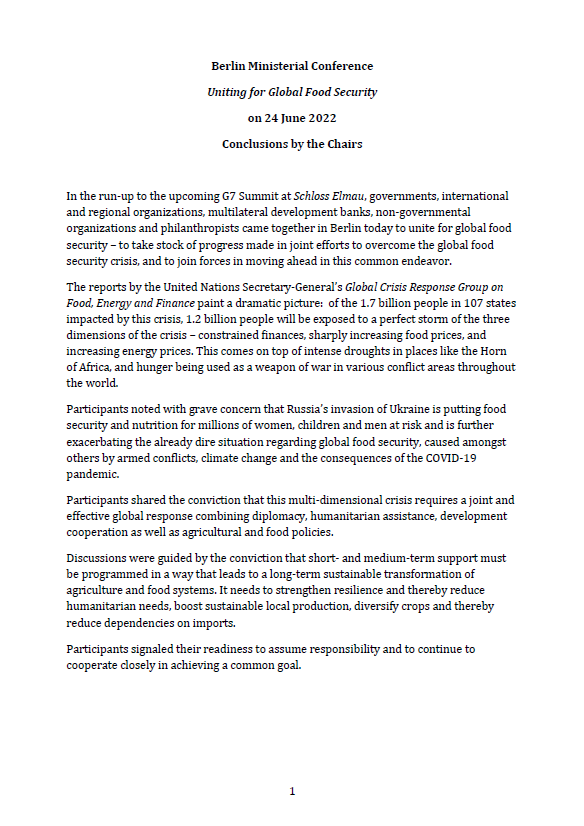Wheat field in northern Mongolia
Copyright© Thomas Köhler/photothek.net
Coordinating aid measures The Global Alliance for Food Security
That is why, in May 2022, the then German Development Minister Svenja Schulze, together with World Bank President David Malpass, launched a Global Alliance for Food Security in the G7 group as a way for equipping the world to face this looming famine. A Secretariat at the World Bank is supporting the Alliance.
The aim of the new Alliance is to ensure that the support reaches those in most urgent need. It supports the UN Global Crisis Response Group on Food, Energy and Finance (External link) and coordinates aid measures relating to food security.
In addition to the immediate response to the current crisis, the long-term transformation of global agri-food systems towards more resilience and sustainability is a key focus.
Sustainable agri-food systems can make countries more resilient to future crises in the medium and long term. The idea is that, by strengthening local production and regional trade and avoiding protectionism and overdependence on particular suppliers, countries are not affected disproportionately by natural disasters such as droughts or heavy rainfall, or when it becomes impossible to obtain imports from certain countries.
Focuses of the Alliance:
- Advisory services and exchange of information on current trends in world markets for cereals, seeds, fertilisers and other agricultural products.
- Coordination of funding and support
- Scientific forecasting to predict the further development of the crisis
The Alliance’s supporters include not only the UN Crisis Response Group, the World Bank, the G7 countries and the EU Commission but also like-minded governments, the African Union, the UN World Food Programme (WFP), the UN Food and Agriculture Organization (FAO) and the International Fund for Agricultural Development (IFAD).
The Alliance is also open to the private sector and to civil society organisations.
30 %
increase of prices for wheat and maize since the beginning of 2022
More than
700 million
people faced hunger in 2023
282 million
people are currently facing acute food insecurity
From 2019 to 2022, the number of people affected by acute food insecurity has risen by more than
120 million
1 US dollar
invested in increasing the resilience of societies will reduce future humanitarian aid by 4 US dollars
60 %
of all people affected by hunger live in regions of conflict
German activities Additional funding to tackle the food crisis
Germany is committed to fighting hunger and malnutrition. The Federal Republic of Germany is the second biggest donor of humanitarian assistance and of funding to the World Food Programme. In the past few years it has invested around two billion euros every year in food security and rural development.
Germany took an early lead and already pledged an additional 430 million euros at the beginning of the year to combat the global food crisis in order to provide timely and effective support to the most affected countries.
Under the German Presidency, the G7 announced further substantial financial assistance at their summit at the end of June 2022: Together, they will provide an additional 4.5 billion dollars to support the Alliance for Global Food Security, among other things, with Germany contributing 450 million euros.
The BMZ is using this additional funding for:
As at: 23/06/2022







